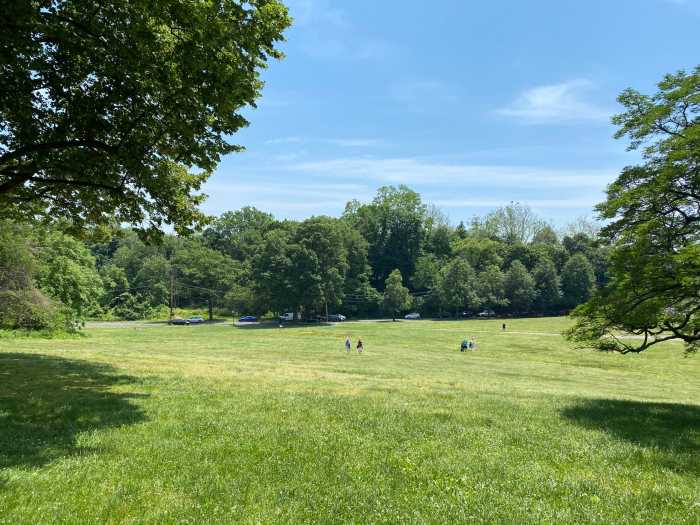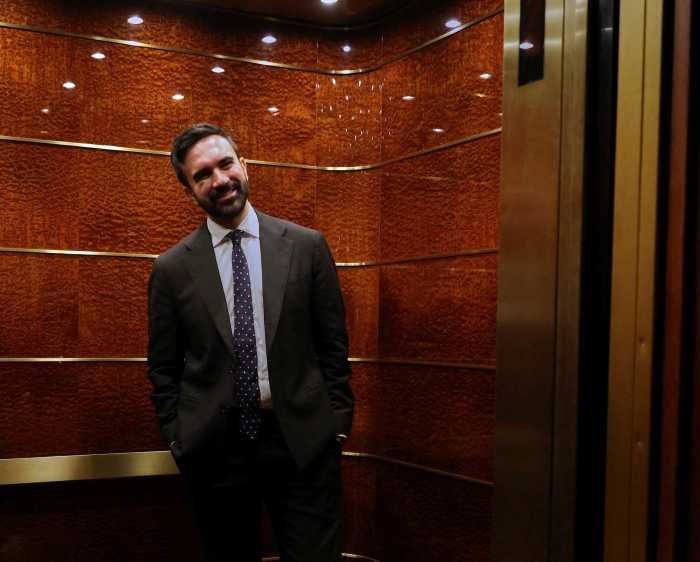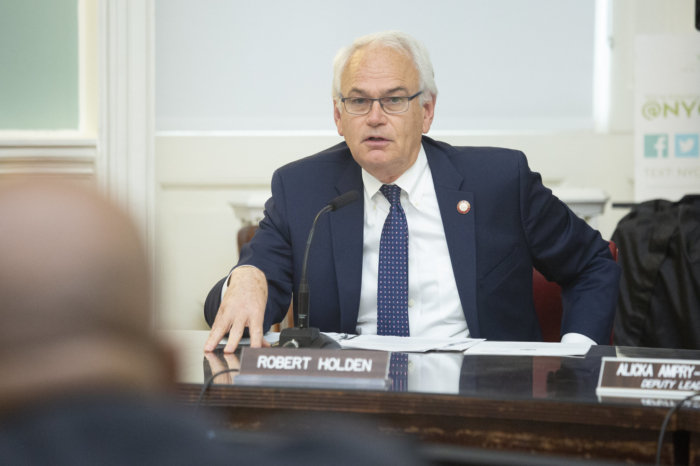Sanitation Rep Reviews Recycling Rules
Ridgewood residents got a crash course on trash disposal and sanitation code changes during the Farmers Oval Civic Association (FOCA) meeting last Thursday, Nov. 20, at Ridgewood Baptist Church.
Glen Nison, Outreach Specialist with the Sanitation Department’s (DSNY) Bureau of Recycling Sustainability (BRS), briefed residents on a new measure banning the curbside disposal of electronics. The new law will take effect in January 2015 and was created by the city in an effort to reduce the amount of electronic waste, as well as harmful chemicals like mercury, in area landfills.
According to Nison, electronics such as computers, printers, televisions, laptops and cell phones will no longer be eligible for regular trash pick-up.
As part of the new law, these items must be taken to area electronic recycling events, such as the bi-annual recycling events held at Forest Park.
Another option, according to Nison, would be to take the items to retailers like Best Buy or Radio Shack for recycling.
A third option for electronics recycling is the implementation of lockable storage bins. The bins are provided by DSNY as part of their “e-cycleNYC” program, and are currently in use in large apartment buildings with 50 or more units. The bins are available in two sizes: small (2 ft deep x 4 ftwidex5fthigh)andlarge(2ft deepx5ftwidex6fthigh). Nison advised residents to band together as a community and request an electronic storage bin at a facility like a local church or community center.
The new law will have a sixmonth grace period before the enforcement and penalty phase begins. The DSNY plans to use the first six months as an educational period, with mass mailings to homeowners updating them on the specifics of the law.
Not all residents at last week’s FOCA meeting were happy about this new law. Some felt the new measure was inconvenient while others were concerned about the logistics of transporting heavier items, such as televisions, from their homes to recycling events.
Nison understood their concerns and explained that curbing electronic waste would benefit the environment and overall public health in the long run.
‘Two streams’ of recycling
Nison explained that the DSNY’s recycling program consists of “two streams.” Mixed paper makes up the first stream and includes individual sheets of paper, as well as heavier corrugated cardboard products, such as boxes. Paper recyclables can be placed in 32-gallon containers and labeled “mixed paper” on all sides. Residents were told they could also place paper recycling in clear plastic bags with a maximum weight of 60 pounds.
He also warned that it is illegal to use cardboard boxes as curbside receptacles for paper recycling or trash. All cardboard and pizza boxes must be broken down, bundled up and secured with twine. Bundles of magazines, phone books and newspapers must be disposed of in the same manner.
Nison explained that twine is preferred over masking tape because it breaks down easily during processing. Individual bundles of paper recycling cannot exceed a maximum of 18 inches high.
Non-recyclable items include hardcover books, wax paper, padded envelopes and contaminated items such as dirty newspapers, napkins or heavily soiled pizza boxes. Metal items such as paper clips and staples are permitted, as they will be removed during processing.
Glass, metal, plastic and aluminum waste makes up the other “stream” of the recycling program. According to the law, all food and beverage containers must be emptied and rinsed prior to disposal. Recyclable metal items include aluminum cans, wire hangers, tools, metal cookware and hardware, such as nuts and bolts. Reasonably clean pieces of aluminum foil and food containers can be recycled, as long as they are not heavily soiled.
Bottles and jars make up the bulk of glass recyclables. All metal lids should be removed, and the bottles and jars emptied and rinsed. Nison warned that items such as broken windows, mirrors and light bulbs were not recyclable, and should be safely discarded during trash pick-ups in a cardboard box labeled “Caution- Broken Glass.”
According to Nison, broken glass should never be disposed of in trash bags as they pose a safety hazard to sanitation workers. Residents could face fines and summonses if they dispose of these items improperly.
Nison also explained some of the new laws regarding plastic recycling to residents. According to Nison, any hard, rigid plastic item can now be recycled. Clean yogurt cups, plastic hangers, plastic trays and laundry hampers are now all recyclable. Plastic bags and wrap, however, are not.
Hazardous materials
The DSNY representative also urged residents to use caution when disposing of dangerous or potentially hazardous items. Items such as regular alkaline batteries, for example, could be discarded in regular trash. It is, however, illegal to throw rechargeable and cell phone batteries into regular trash as they pose a combustible or fire hazard.
According to Nison, retail stores like Radio Shack are required to take batteries back free of charge for proper recycling.
Other hazardous items such as chemicals, expired medication, flammable liquids and poisonous cleansers can be disposed of at “SAFE” (Solvents, Automotives, Flammables and Electronics) events held throughout the city. Air conditioners and refrigerators, both of which contain harmful CFC gases, can be disposed of only after making an appointment with DSNY via 311 for proper tagging and curbside pick-up. For more information, Nison urged residents to call 311.
Local issues
Nison warned residents to be wary of the large metal clothing collection bins that have been populating local streets.
“These clothing bins are illegal and most of them are for profit,” stated Nison.
FOCA President Dieter Vey urged residents to contact 311 or Community Board 5 to report a bin. DSNY has teamed up with Housing Works to create the “RefashioNYC” Program, which sells gently used clothing in local Housing Works thrift stores.
Nison also advocated for the revamped organics-recycling program, currently in its two-year pilot phase in parts of Ridgewood and Glendale.
FOCA member and DSNY retiree Patricia Grayson also voiced her support of the program. As a former employee of the Bureau of Waste Prevention, Grayson recalled the city’s first attempt at an organics program nearly 29 years ago.
“It’s a wonderful program and something we really need,” she explained.
Residents also voiced frustration over the loss of public trash baskets on Fresh Pond Road. Many FOCA members recalled situations where trash from the avenue found its way onto their sidewalks, sometimes resulting in summonses for homeowners. The baskets were removed because some residents near Fresh Pond Road were illegally dumping household trash, creating an overflow of garbage at corners.
Vey praised the efforts of the nonprofit Doe Fund in helping to keep the local streets clean, but reminded residents that they were responsible for the sidewalks in front of their homes.
* * *
The Farmers Oval Civic Association will not meet in December. Its next meeting is Thursday, Jan. 29, at 7:30 p.m. at the Ridgewood Baptist Church, located at 64-13 Catalpa Ave., across from the 104th Precinct.




































